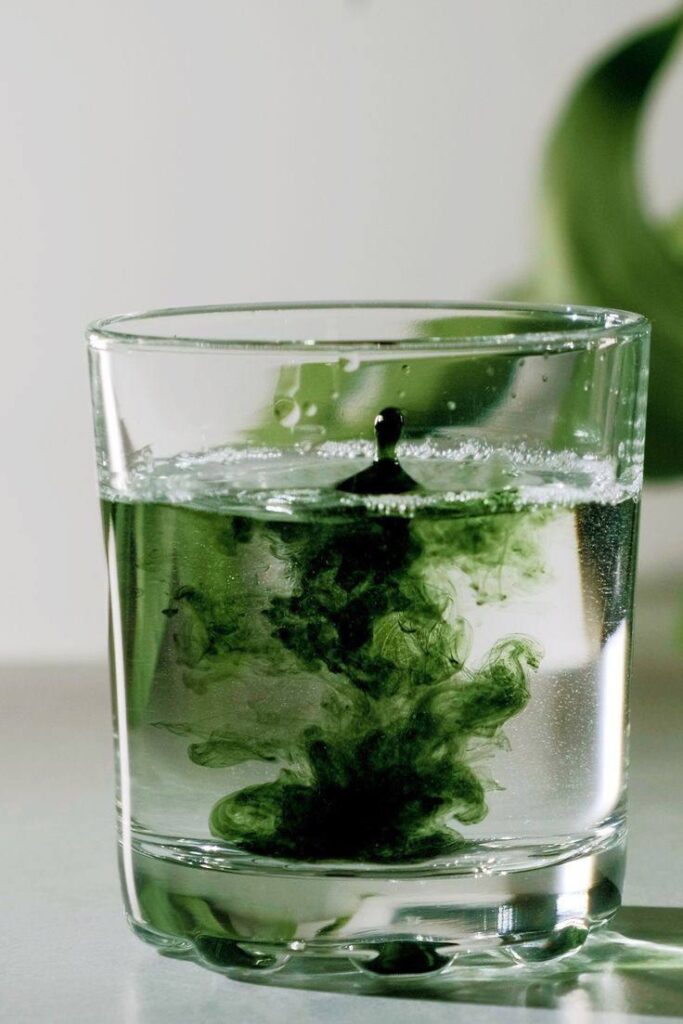It’s common knowledge that eating greens is good for you, but what if you could extract the greens and take them as a supplement? A recent trend has seen more people doing exactly that. Chlorophyll is the substance that gives plants their green color, and its supplements in liquid or tablet form are becoming popular.
Again, it turns sunlight into food for plants, so they look healthy and function properly. It’s also responsible for the brilliant green shade of some of our favorite veggies and algae. But can it also promote health in the human body?
That’s the idea behind the chlorophyll craze, so it’s no wonder the compound has gained such a large following in wellness circles. It contains vitamins, antioxidants, and therapeutic properties that can benefit the body. It can be obtained from plants or supplements.
What Food Contains Chlorophyll?
Chlorophyll is present in most green vegetables. Some of these include spinach, kale, romaine lettuce, parsley, broccoli, chlorella, spirulina, parsley, and matcha green tea. Liquid chlorophyll, technically known as chlorophyllin, is the human-made, concentrated extract of the plant substance.
ALSO READ: 5 Ways Ozempic, Other Weight Loss Drugs May Improve Your Health
Chlorophyllin contains copper instead of the magnesium that’s found in naturally occurring chlorophyll. It’s also water-soluble and better absorbed by the body.

Also, in tests where doses of chlorophyllin were taken, researchers detected copper in blood plasma, implying absorption had occurred.
Health Benefits of Chlorophyll
Chlorophyll has been regarded as having health benefits for decades. A variety of studies have suggested it might be helpful for several health issues. Some of the claims about chlorophyll’s potential benefits are associated with treating skin conditions, neutralizing body odors, and fighting certain kinds of cancer.
Although, in some studies, chlorophyllin, the liquid form of chlorophyll, has been shown to reduce inflammation. In pilot studies, topical chlorophyllin gel improves acne and large pores, sun-damaged skin, over periods of weeks.
Studies have found that chlorophyll and its derivatives act as antioxidants. These wonder compounds fight free radicals in the body, helping to prevent skin and cell damage. Chlorophyll is also an excellent source of vitamins A, C, and E, which promote healthy-looking skin through cellular repair and skin rejuvenation.
Hence, it has potential anti-aging benefits. Furthermore, liquid chlorophyll is also claimed to improve the quality of red blood cells. In a pilot study, wheatgrass, which is very high in chlorophyll, reduced the number of blood transfusions needed in patients taking part. However, the study’s authors didn’t conclude that chlorophyll was the reason why.
Detoxifies
The structure of chlorophyll in plants is very similar to hemoglobin in red blood cells, which might aid the body’s natural detoxification pathways by encouraging greater circulation of oxygen and energy.
Aids Weight Loss
One of the biggest claims about chlorophyll is its potential to aid weight loss. Unfortunately, research is limited. Nevertheless, the existing research suggests it can reduce harmful cholesterol levels, but more studies are needed.
Reduces Cancer Risk
In animal studies, chlorophyll has been shown to reduce the incidence of liver tumors and significantly decrease pancreatic tumor size. Trials are underway to understand how chlorophyll consumption can impact liver and colon cancer risk in humans.
Used As Deodorant
In addition, since the 1940s, chlorophyllin has been used as a natural deodorant, but studies show mixed results. Claims about its ability to reduce bad breath also aren’t backed by research.
Suitable To Heal Surgical Wounds
Studies from the 1940s and ’50s suggested chlorophyll might help to heal surgical wounds and prevent infections. A medication containing chlorophyllin was shown to reduce odor and promote wound healing in a 2008 review.
ALSO READ: These Everyday Foods and Drinks Naturally Boost Your Energy
Chlorophyll As Supplement
Chlorophyll supplements are available at most health food stores in powders, capsules, tablets, ointments, sprays, or liquid form.
Risks
Although natural chlorophyll and chlorophyllin aren’t known to be toxic, their consumption does come with a risk of digestive problems, diarrhea, strange stools, or itching/burning (when topically applied).

Daily Dosage
Generally, the recommended daily consumption of chlorophyllin supplements is between 100 mg and 300 mg per day, spaced out over three separate doses. For liquid chlorophyll, usually, it’s recommended to take around 1 teaspoon (5 milliliters) of the supplement, added to water. You can add more water to reduce the taste if you notice one.
Conclusively, if you’re concerned about the potential risks or are taking medication, ask a doctor or nutritionist for advice before taking the supplement.
You Might Also Like:
Tiffany Haddish Opens Up About Court-Mandated Sobriety After DUI Arrest
Gisele Bündchen Breaks Silence on Infidelity Rumors, Says She Didn’t Cheat on Tom Brady
Katie Couric Announces She’s Officially a Grandma!
Why Are Bidets Just Getting Popular in America
Kate Middleton’s Uncle Apologizes for Blasting Meghan Markle in Interview
